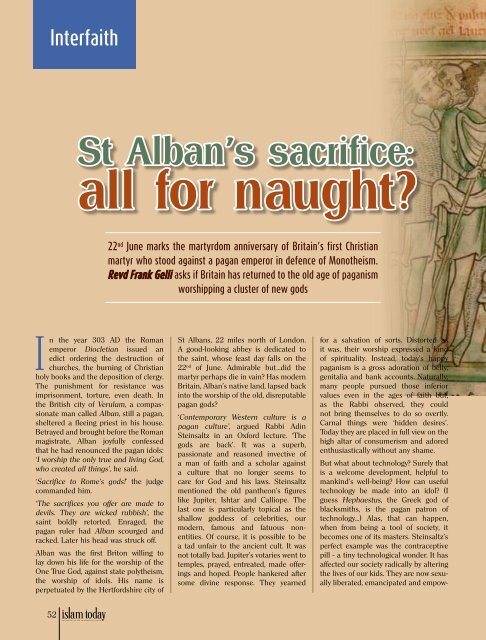Create successful ePaper yourself
Turn your PDF publications into a flip-book with our unique Google optimized e-Paper software.
InterfaithSt Alban’s sacrifice:all for naught?22 nd June marks the martyrdom anniversary of Britain’s first Christianmartyr who stood against a pagan emperor in defence of Monotheism.Revd Frank Gelli asks if Britain has returned to the old age of paganismworshipping a cluster of new godsIn the year 303 AD the Romanemperor Diocletian <strong>issue</strong>d anedict ordering the destruction ofchurches, the burning of Christianholy books and the deposition of clergy.The punishment for resistance wasimprisonment, torture, even death. Inthe British city of Verulam, a compassionateman called Alban, still a pagan,sheltered a fleeing priest in his house.Betrayed and brought before the Romanmagistrate, Alban joyfully confessedthat he had renounced the pagan idols:‘I worship the only true and living God,who created all things’, he said.‘Sacrifice to Rome’s gods!’ the judgecommanded him.‘The sacrifices you offer are made todevils. They are wicked rubbish’, thesaint boldly retorted. Enraged, thepagan ruler had Alban scourged andracked. Later his head was struck off.Alban was the first Briton willing tolay down his life for the worship of theOne True God, against state polytheism,the worship of idols. His name isperpetuated by the Hertfordshire city ofSt Albans, 22 miles north of London.A good-looking abbey is dedicated tothe saint, whose feast day falls on the22 nd of June. Admirable but...did themartyr perhaps die in vain? Has modernBritain, Alban’s native land, lapsed backinto the worship of the old, disreputablepagan gods?‘Contemporary Western culture is apagan culture’, argued Rabbi AdinSteinsaltz in an Oxford lecture. ‘Thegods are back’. It was a superb,passionate and reasoned invective ofa man of faith and a scholar againsta culture that no longer seems tocare for God and his laws. Steinsaltzmentioned the old pantheon’s figureslike Jupiter, Ishtar and Calliope. Thelast one is particularly topical as theshallow goddess of celebrities, ourmodern, famous and fatuous nonentities.Of course, it is possible to bea tad unfair to the ancient cult. It wasnot totally bad. Jupiter’s votaries went totemples, prayed, entreated, made offeringsand hoped. People hankered aftersome divine response. They yearnedfor a salvation of sorts. Distorted asit was, their worship expressed a kindof spirituality. Instead, today’s happypaganism is a gross adoration of belly,genitalia and bank accounts. Naturally,many people pursued those inferiorvalues even in the ages of faith but,as the Rabbi observed, they couldnot bring themselves to do so overtly.Carnal things were ‘hidden desires’.Today they are placed in full view on thehigh altar of consumerism and adoredenthusiastically without any shame.But what about technology? Surely thatis a welcome development, helpful tomankind’s well-being? How can usefultechnology be made into an idol? (Iguess Hephaestus, the Greek god ofblacksmiths, is the pagan patron oftechnology...) Alas, that can happen,when from being a tool of society, itbecomes one of its masters. Steinsaltz’sperfect example was the contraceptivepill - a tiny technological wonder. It hasaffected our society radically by alteringthe lives of our kids. They are now sexuallyliberated, emancipated and empow-ered young people, as the gaff has it. Orare they perhaps degraded to the role offrenetic, copulating monkeys? Unwittingworshippers of phoney, dead deities likeAphrodite and Dionysus?I differ, however, from the learnedRabbi on one important thing. Weshould distinguish between culture andreligion. A secular culture may decaybut a religion; a true, living and gracefilledfaith does not. Some peculiartheologians notoriously have presumedto proclaim ‘the death of God’. By doingso they have confused the senile deityof their fantasies with the AlmightyCreator and Sustainer of the Universe.God is not identical with culture. God isabove culture. God can indeed be envisagedto be against culture. When StAlban determined to oppose the paganestablishment and authorities he did itunder the banner of Christ and in theservice of the One True God. It cost themartyr his life but it won him an eternal,imperishable crown in Heaven. Thereis nothing sacrosanct about a godlessculture. It deserves no respect andcertainly no allegiance from persons offaith. At the very least, believers are freeto criticise a paganising culture.As a Christian I do not wish to beunduly bellicose, yet I am thinking ofthat awesome contest on Mount Carmelnarrated in the Bible. The ProphetElijah spoke to his people: ‘If the Lordis God, follow him; but if it is Baal thenfollow him.’ Baal was the name of thedeity of the Canaanites. Elijah stoodalone at Mount Carmel. Ranked againsthim were 450 ‘prophets’ of Baal. Well,their god proved to be a dud. He did notanswer their prayers so Elijah tauntedthem in suitably un-parliamentarylanguage: ‘Where is your god? Has hegone to the toilet?’ The upshot was thatthe worshippers of Baal got their comeuppance.Theirs was a gory end but...itserved them right. (I Kings:18) Idolatrycalls for a robust response.The struggle between God Almighty, theone true Lord of Heaven and Earth, andBaal, a man-made idol, is never-ending.When Jesus, the Messiah of God,came on earth in fulfilment of ancientprophecies he too warned the Israelitesagainst idolatry: ‘No one can serve twomasters. You cannot serve both God andMammon.’ Mammon is a Semitic wordstanding for the god of wealth - anotherresurrected idol. And Muslims will ofcourse be familiar with the exampleof the Prophet Muhammad, how hesmashed the idols that had disfiguredthe Kaaba in Mekkah - a propheticaction par excellence.St Alban died rather than submit toidols. Not every believer is given thegrace to be a martyr, of course. Humannature is weak. What is vital is thatidolatry should be recognised anddenounced, even today, in all its forms.God wills it. •Revd Frank Julian Gelli is anAnglican priest, cultural criticand a religious controversialist,working on religious dialogue.His last book “Julius Evola: theSufi of Rome’ is available onAmazon Kindle.5253


